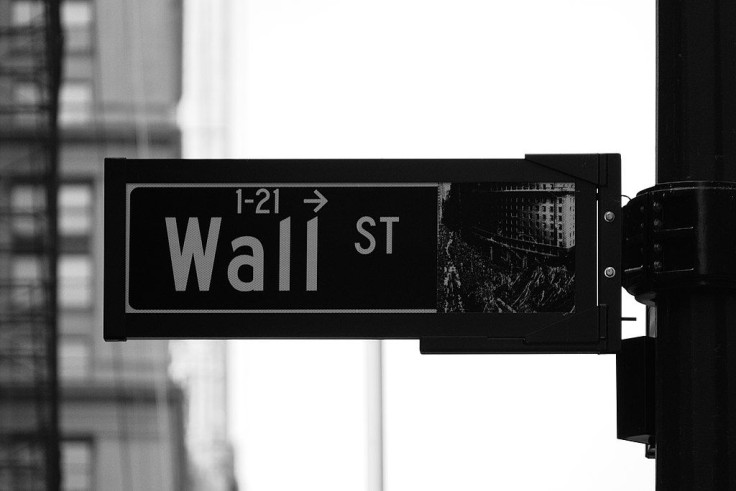Wednesday's Stock Market Close: US Equities Finish Mixed On Bernie Sanders' Threat To Hold Up Stimulus Bill

KEY POINTS
- Former Fe chief Ben Bernanke praised Jerome Powell's handling of the crisis.
- The German Ifo business climate index dropped to 86.1 in March
- U.S., total mortgage application volume plunged 29.4% last week
U.S. stocks surged on Wednesday after lawmakers reached an agreement on a $2 trillion stimulus package to save the economy from the damage wrought by the coronavirus. However, equities tailed off in final minutes of trading after Sen. Bernie Sanders (I-Vt.) said he might “put a hold on this bill until stronger conditions are imposed on the $500 billion corporate welfare fund.”
The Dow Jones Industrial Average gained 495.64 points to 21,200.55, while the S&P 500 gained 28.23 points to 2,475.56 and the Nasdaq Composite Index slipped 33.56 points to 7,384.30.
Volume on the New York Stock Exchange totaled 7.2 billion shares with 2,506 issues advancing, three setting a new high, and 514 declining, with 53 setting new lows.
Active movers were led by Ford Motor (F), General Electric Co. (GE) and Bank of America (BAC).
The White House and Senate leaders earlier reached agreement early Wednesday morning on a huge $2 trillion coronavirus stimulus bill. It was said to be the biggest rescue package in U.S. history.
“At last we have a deal,” Republican Senate Majority Leader Mitch McConnell said. “In effect, this is a war-time level of investment into our nation.”
McConnell said the bill will provide financial assistance to Americans through direct checks to households, increased unemployment insurance, and hundreds of billions of dollars in loans to small businesses, among other things.
“The stimulus measures will continue acting as equity tailwinds as they seep into corners of the credit market presently locked,” said Adam Crisafulli, founder of Vital Knowledge. But he added that the market “is clearly moving much faster than underlying fundamentals and just as sharp declines on prior sessions exaggerated economic conditions, the rebounds will too.”
Former Federal Reserve Chairman Ben Bernanke said Wednesday the U.S. economy will undergo a quick rebound after a “very sharp” recession.
“If there’s not too much damage done to the workforce, to the businesses during the shutdown period, however long that may be, then we could see a fairly quick rebound,” Bernanke said. “I think the Fed has been extremely proactive, and Jay Powell and his team have been working really hard and gotten ahead of this and shown they can set up a whole bunch of diverse programs that will help us keep the economy functioning during this shutdown period.”
Some analysts were more cautious.
“People have to contend with the idea that the longer [this crisis] lasts, the more people potentially are losing their job,” said Yousef Abbasi, director of U.S. institutional equities at INTL FCStone. “So to see a sustainable rally at this point, is going to be very difficult.”
Johns Hopkins University reported more than 400,000 coronavirus cases worldwide, including more than 50,000 in the U.S.
The German Ifo business climate index dropped to 86.1 in March from 96.0 in February.
“It should not come as a surprise to anyone but economic data for March and beyond will be horrible and probably even beyond the traditional meaning of horrible,” Carsten Brzeski, chief economist at ING Germany said.
“All Western economies are facing an unprecedented crisis. Recession is not even the right word for an almost complete standstill of entire economies, almost overnight. Germany is no exception,” he added.
Claus Vistesen, chief euro zone economist at Pantheon Macroeconomics, said the German economy is “sliding into the abyss.”
In the U.S., total mortgage application volume plunged 29.4% last week, according to the Mortgage Bankers Association.
Orders for durable goods unexpectedly rose by 1.2% in February.
Overnight in Asia, markets rose. China’s Shanghai Composite gained 2.17%, while Hong Kong’s Hang Seng jumped 3.81%, and Japan’s Nikkei-225 surged 8.04%.
In Europe markets finished mixed as Britain’s FTSE-100 rose 1.94%, France’s CAC-40 gained 2.28% and Germany’s DAX fell 0.63%.
Crude oil futures rose 2.04% at $24.50 per barrel, Brent crude edged up 0.83% at $30.24. Gold futures dropped 1.37%.
The euro rose 0.95% at $1.089 while the pound sterling gained 1.19% at $1.1897.
The yield on the 10-year Treasury jumped 5.15% to 0.858% while yield on the 30-year Treasury rose 3.94% to 1.423%.
© Copyright IBTimes 2025. All rights reserved.





















